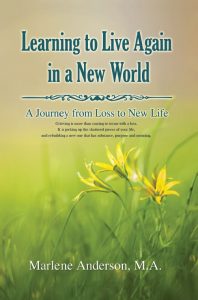Listen to this episode of the Focus with Marlene Podcast
Get caught up with all episodes in the “Threads of Life” series
The plaintive sound of a foghorn filtered through the grey morning mist as our sailboat pushed away from the protective harbor of Victoria, BC and slipped silently into the Strait of Juan de Fuca. The stillness of the morning was broken only by the low constant chug, chug of our diesel engine and the caw of a lonely seagull taking flight overhead.
The shoreline and our boat were soon swallowed by a grey, colorless matter silently and swiftly moving over the water. Although it had no shape or body, it was as unyielding and impenetrable as any brick wall.
One moment we saw the sky and receding shoreline; the next minute every point of reference was gone. In a matter of minutes, we were engulfed by dense fog that left us disoriented and unsure of where we were or the direction we were headed.
Fog.
Not only was visibility reduced to a few feet; even the sound of the fog horns became disorienting, making it difficult to distinguish distance or direction. We throttled back on the engine and cautiously glided forward relying on instruments, charts, and our knowledge of navigation.
Without them, we would soon be traveling in circles, entering dangerous shipping lanes, or ending on shoals and rocks. It is unnerving to see a huge ship emerging like some phantom apparition from a murky wall of white in front of you.
So why would any sane person leave a safe, snug harbor to venture out in this uncertain, potentially treacherous condition?
We left because we needed to reach the other side of the strait within a designated timeframe. Our options were limited.
But we didn’t leave our safe harbor unprepared.
The marine weather channel told us the fog was not going to settle in for a long period of time. Our boat and engine were in good working condition and we had plenty of fuel.
We had the knowledge and training of navigation courses. Our navigation charts were current and defined the areas of safe travel by numbered buoys, some flashing a sequence of lights and some with bells and fog horns programmed to sound and flash warnings.
Although we did not have all the sophisticated instruments most boaters of today have, we were prepared to negotiate the waters safely.
How is all this relevant to you and me, who are safely tucked into our lives on shore?
We know it is essential to venture out of our safe harbors at some point in order to live life. And just as a sailor knows his very life depends on his preparation, knowledge, and planning for whatever voyage he embarks on, it is equally as important for us to prepare for our journey through life.
As young adults, we leave the safe harbors of our homes and strike out fearlessly in uncharted waters totally unprepared for the rocks and shoals and obstacles that can shipwreck us.
We are unprepared for the catastrophes that appear out of the unknown as large as ocean liners bearing down on us through the fog. We are not only unprepared for critical and precarious times; we are unprepared for maximizing our time and energy in the normal routines of life.
Life teaches us many things.
When we have survived a storm and returned to our safe harbors, we reflect on what was required before venturing out again. Just as a sailor charts his course over the water from point to point, we need to set specific goals that not only give us a direction and destination for our careers, but also our lives.
Anticipation of known and unknown obstacles helps us prepare for the unexpected.
Developing plans of action includes building positive relationships with spouses and family.
Setting aside time for God as well as recreation and relaxation are vital in reaching our destinations.
Navigating life
Life navigation skills include knowing how to communicate, how to listen, how to problem solve and work together. It requires the establishment of efficient routines and habits. The skill of self-discipline and self-regulation prepare us for any storm of life. If we ignore the preparation for leaving the safety of our safe harbors, we will find ourselves in dangerous waters and sometimes crashing on the rocks.
Life is a risk. The future is like the fog.
Are you willing to venture out of your harbor? There are exciting and rewarding adventures waiting for you. But to experience them to the fullest, it is important to be prepared before venturing out.
As we learn how to prepare for our journeys, a confidence is developed. God’s manual on living defines the navigation skills we need to avoid rocks and shoals. In that self-assurance, we ask God for the strength we need and the wisdom to sort through the maze of life’s challenges. It enables us to leave our safe harbors and step out into unknown waters.
Marlene Anderson, MA, LMHC, NCC
 Learning to Live Again in a New World
Learning to Live Again in a New World
We need validation for the turmoil of thoughts and emotions we experience. But we also need the tools necessary to create a new beginning that is both satisfying and meaningful. My book, Learning to Live Again in a New World, offers those tools to help work through the problems you might be facing.
It is a guide to help you through the ups and downs of grieving a significant loss. And it includes a study guide at the end for use with groups.


